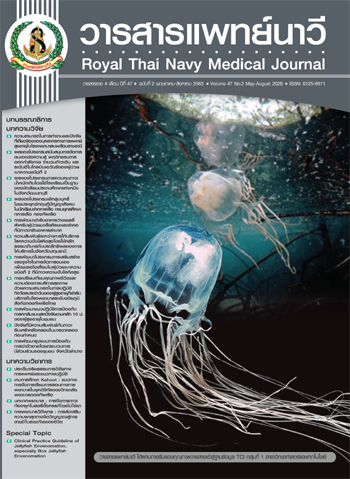Factors Related to Postpartum Depression among Mothers of Preterm Infants
Main Article Content
Abstract
The aim of study was to examine the relationship between infant birth weight, maternal well-being, perceived infant well-being, self-esteem and nurse support, and postnatal depression among mothers of preterm infants. Participations’ were 110 mothers of preterm infants hospitalized in Tertiary Care Hospital in the 7th Area Health, who visited their infants at two weeks after their infants’ hospitalization. Pearson' s correlations coefficient and Spearman' s rank correlations coefficient were employed for data analysis.
The results revealed that postpartum depression was found in 50.90 %. There were moderate negatively association between postpartum depression and self-esteem (r = -.385, p < .001), maternal well-being (r = -.353, p < .001), and perceived infant well-being (r = -.344, p < .001). However, nurse support and infant birth weight were not statistically correlated with postpartum depression. Study findings suggest that nurse would potentially prevent postpartum depression among mothers of hospitalized preterm infants by promoting maternal self-esteem, maternal well-being, and perceived infant well-being.
Article Details

This work is licensed under a Creative Commons Attribution-NonCommercial-NoDerivatives 4.0 International License.
References
World Health Organization [WHO]. Preterm birth. [Internet]. [cited 2018 March 8]. Available from: http://www.who.int/ mediacentre/factsheets/fs363/en/.
Bureau of Policy and Strategy. Public health statistics 2015. Bangkok: Samcharoen Panich (Bangkok); 2010. p. 38. (in Thai).
Ministry of Public Health. The percentage of newborns weighing less than 2,500 grams. [Internet]. [cited 2018 March 8]. Available from: https://hdcsrvice.moph.go.th/
hdc/reports.php?source =formated/ format_1.php&cat_id =1ed90bc32310b503b7
ca9b32af425ae5&id= ce4fcd9cd41b6cb2f79b2440a6f4cc. (in Thai).
Chawanpaiboon S. Preterm labour. Bangkok: P.A. Living; 2010. (in Thai).
Gambina I, Soldera G, Benevento B, Trivellato P, Visentin S, Cavallin F, et al. Postpartum psychosocial distress and late preterm delivery. Journal of Reproductive and Infant Psychology 2011;29(5):472-9.
Gulamani SS, Premji SS, Kanji Z, Azam SI. Preterm birth a risk factor for postpartum depression in Pakistani women. Open Journal of Depression 2013;2(4):72-81.
Prechon K. Postpartum depression: prevention and care. Thai Red Cross Nursing Journal 2013;9(2):24-35. (in Thai).
Graves BW, Johnson R. Varney’s midwifery. 5th ed. Burlington: Jones & Bartlett Learning; 2015.
Vacharaporn K, Pitanupong J, Sam-angsri N. Development of The Edinburgh Postnatal Depression Scale Thai version. Journal of Mental Health of Thailand 2003;11(3):164-9. (in Thai).
Raksapakdee R, Srisaeng P, Ungpansattawong S. The relationships of selected factors and postpartum depression among postpartum mothers with hospitalized preterm infants. Journal of Nursing Science & Health 2018;41(1):1-11. (in Thai).
Herguner S, Annagur A, Altunhan H, Ors R. Postpartum depression in mothers of infants with very low birth weight. Archives of Neuropsychiatry 2013;50(1):30-3.
Hawes K, McGowan E, O'Donnell M, Tucker R, Vohr B. Social emotional factors increase risk of postpartum depression in mothers of preterm infants. The Journal of Pediatrics 2016;179(1):61-7.
Negron R, Martin A, Almog M, Balbierz A, Howell EA. Social support during the postpartum period: mothers’ views on needs, expectations, and mobilization of support. Maternal Child Health Journal 2012;17(1):616-23.
Alkozei A, McMahon E, Lahav A. Stress levels and depressive symptoms in NICU mothers in the early postpartum period. Journal of Maternal-Fetal and Neonatal Medicine 2014;27(17):1-17.
Ihongbe TO, Masho SW. Do successive preterm birth increase the risk of postpartum depressive symptoms. Journal of Pregnancy 2017;2017(1):1-10.
Srisatidnarakul B. Research methodology in nursing. 5th ed. Bangkok: U & I Inter Media; 2010. (in Thai).
Niramitpasa J. Personal factors, self-esteem, social support and psychosocial adjustment of pregnant women with advanced age. [Master’s Thesis, Faculty of Nursing]. Mahidol University; 2008. (in Thai).
Teerarungsikul N. The lived experience of mothers with premature babies. Journal of Nursing and Education 2012;5(1):25-39. (in Thai).
Sumneangsanor T. Coping with loss and grief. Journal of Science and Technology 2013;21(7):658-67. (in Thai).
Amankwaa LC, Pickler R, Boonmee J. Maternal responsiveness in mothers of preterm infants. Newborn and Infant Nursing Reviews 2007;7(1):25-30.
Bunmachu D, Khunlan Theunnadee S. Effects of promotion program on perceived self – efficacy preterm caring behaviors of mothers and health status of preterm babies. Journal of Nursing and Health Care 2015;33(4):150-8. (in Thai).
Ballantyne M, Benzies KM, Trute B. Depressive symptoms among immigrant and Canadian born mother of preterm infants at neonatal intensive care discharge: a cross sectional study. BMC Pregnancy and Childbirth 2015;13(1):1-11.
Bicking C, Moore G. Maternal perinatal depression in the neonatal intensive care unit: the role of the neonatal nurse. Neonatal Network 2012;31(5):295-304.
Bergstrom EB, Wallin L, Thomson G, Flacking R. Postpartum depression in mothers of infants cared for in a neonatal intensive care unit–incidence and associated factors. Journal of Neonatal Nursing 2012;18(4):143-51.


